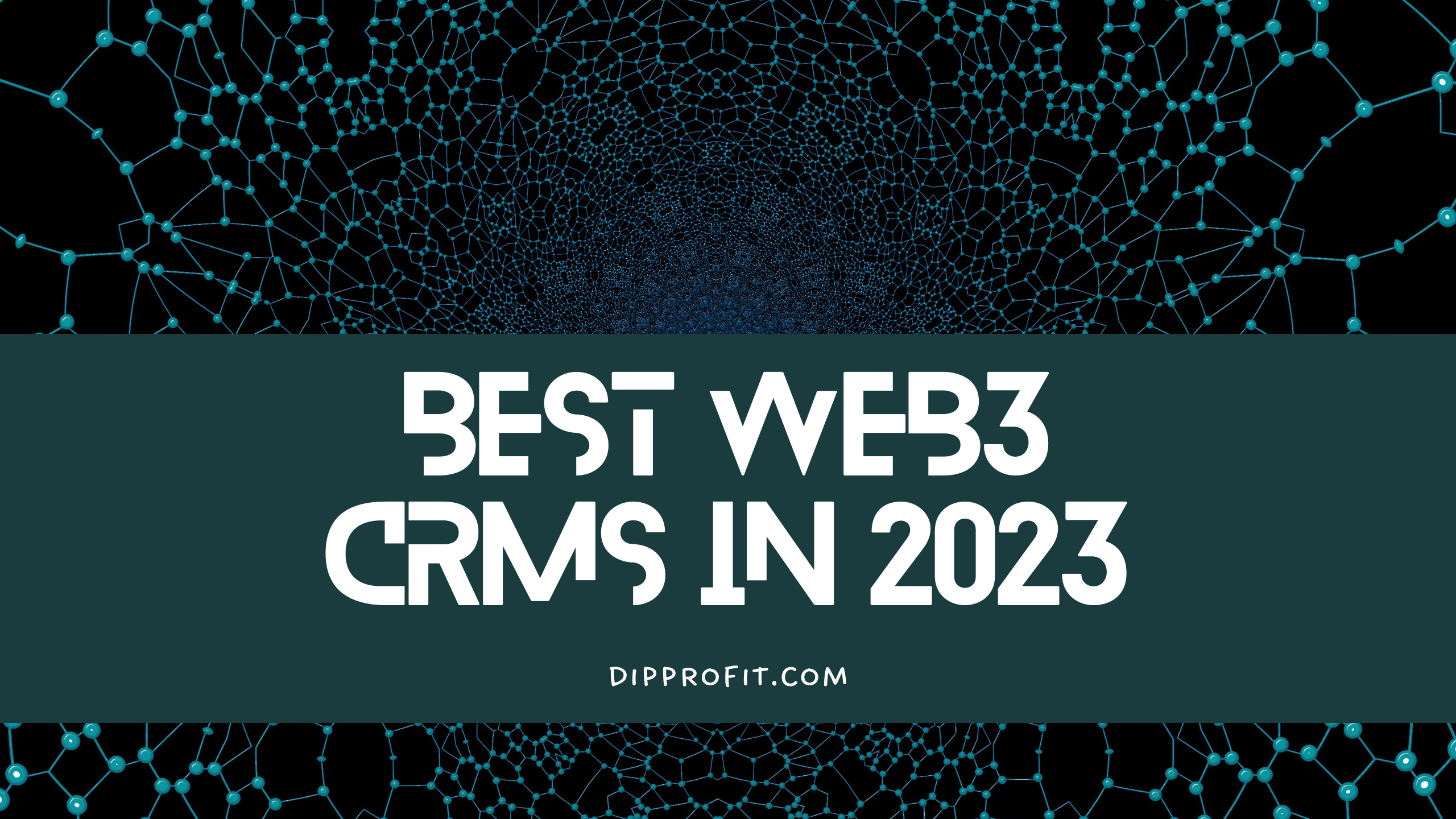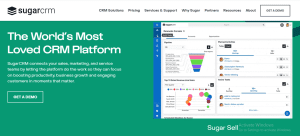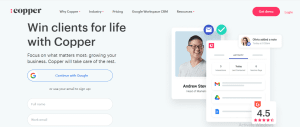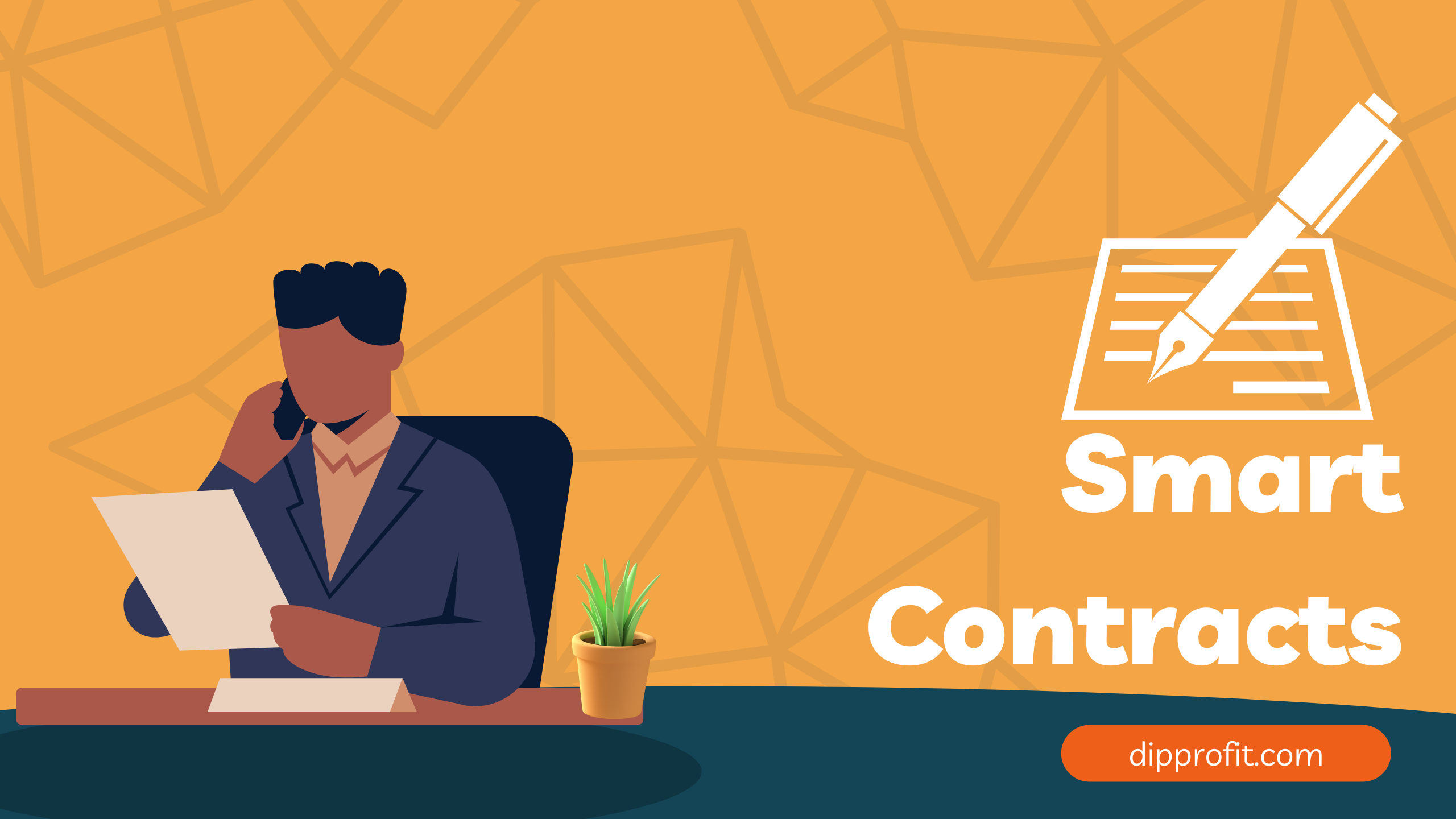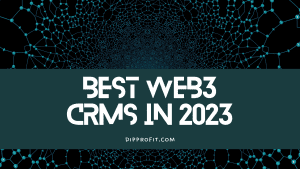
Picture this…
You’re a Web3 entrepreneur who’s just launched the next big thing in decentralized finance.
You’ve got users from all over the world, and your platform is growing faster than you ever imagined. But as your business expands, you’re starting to realize that managing your customer relationships on the blockchain is no easy feat.
That’s where a CRM comes in.

With a Web3 CRM, you can manage your customer relationships on decentralized networks, while also gaining valuable insights into their behavior on the blockchain.
As blockchain technology continues to transform the way we do business, the need for customer relationship management (CRM) tools specifically designed for Web3 companies has become increasingly important.
These Web3 CRMs offer features and integrations that enable businesses to build stronger relationships with their customers on decentralized networks, while also providing valuable insights into customer behavior on the blockchain.
In this blog post, we’ll explore what Web3 CRMs are, why they’re important for Web3 businesses, and some examples of popular Web3 CRMs in the market today.
Whether you’re a blockchain startup or an established business looking to expand into the world of Web3, this post will provide you with a comprehensive overview of the benefits of Web3 CRM and how it can help you grow your business.
What is Web3 CRM and why is it important?
CRMs (Customer Relationship Management) are software tools used by businesses to manage and simplify their interactions with customers.
CRMs allow companies to store customer data, track leads and sales, manage marketing campaigns, and provide customer support.
They typically include features such as data entry, contact management, lead management, sales forecasting, and reporting. These software tools are designed to help businesses automate and optimize their customer interactions, leading to increased efficiency and improved customer satisfaction.
The Web3 CRM is a new way of managing customer relationships that takes advantage of the decentralized nature of blockchain technology. They now provide businesses with a more secure and transparent way of managing customer data, and it allows for more personalized and efficient interactions with customers.
See also: Tech Guide: How to Build a Web3 Community Brand
How does web3 CRM work?
CRMs work by centralizing and organizing data related to customer interactions and transactions.
This information can be accessed by various departments within a business, including sales, marketing, and customer support.
Here are the typical steps in the process of using a CRM:
1. Data collection: The CRM collects data about customers, including contact information, purchase history, and engagement with marketing campaigns.
2. Data organization: The CRM organizes this data to make it easily accessible and simple. This allows businesses to segment customers based on various criteria, such as location or purchase history.
3. Customer engagement: The CRM tracks customer interactions with the business, such as phone calls, emails, and website visits. This allows businesses to provide personalized and effective customer service.
4. Sales Management: The CRM tracks sales opportunities and manages the sales process, from lead generation to closing deals.
5. Analytics and reporting: The CRM provides analytics and reporting features that allow businesses to track their performance, measure the success of marketing campaigns, and identify areas for improvement.
Overall, web3 CRMs assist businesses by giving a complete view of customer interactions which improves their customer relationships
Here are some popular examples of Web3 CRM Platforms in 2023:
Web3 CRM is a relatively new category of customer relationship management tools that are specifically designed for blockchain-based businesses. Here are some examples:
- Kustomer CRM
- Hubspot CRM
- Salesforce CRM
- Zoho CRM
- Sugar CRM
- Copper CRM
Kustomer:
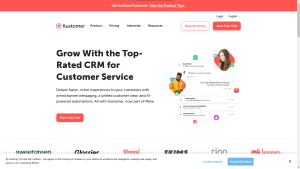
Kustomer is a Web3 CRM that enables businesses to build stronger relationships with their customers by providing a 360-degree view of customer data.
It offers integrations with several blockchain-based platforms, including Ethereum and Polkadot.
Kustomer offers four different plans for users to choose from:
Professional: $29 per month with the ability to add 10 users and features such as voice provider integrations, email, and social media integrations, and over 60+ app integrations.
Business: Everything in the Professional Plan is here for $49 per month for additional users, collaboration hours, brands, and languages with additional features such as scheduled reports and custom integrations.
Enterprise: Proactive chat, custom conversation statuses, and everything included in the Business plan for $89 per month.
Ultimate: This plan includes advanced analytics and sandbox access, plus everything in the Enterprise Plan for $139 per month.
HubSpot:

HubSpot is a popular CRM platform that has recently started offering support for Web3 integrations.
It allows businesses to connect with customers on blockchain networks and provides tools for managing and analyzing customer data.
Salesforce has a variety of plans for users to choose from such as:
Free Tools: Starting at $0 per month with features like email marketing, live chat, contact management, and a limited number of forms. It also includes basic reporting and analytics.
Starter: Starting at $18 per month and limited to features such as lead capture forms, ad management, and basic marketing automation. It also offers more reporting and analytics capabilities than the Free plan.
Professional: Starting at $450 per month. This plan offers even more advanced marketing automation capabilities, including workflow automation and more advanced lead nurturing. It also includes advanced reporting and analytics features, as well as integrations with third-party apps.
Enterprise: HubSpot’s Enterprise plan offers the most advanced features, including advanced automation, predictive lead scoring, and advanced reporting and analytics for $1200 per month. It also includes more advanced integrations with third-party apps and additional support options.
Salesforce:
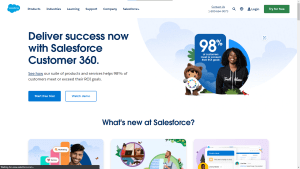
Salesforce is a leading CRM platform that has also started offering support for Web3 integrations.
It provides businesses with a suite of tools for managing customer data and interactions on blockchain networks.
Salesforce’s pricing plans include a wide range of features, with the level of features increasing as you move up the pricing tiers.
The following are some of the key features available in each of Salesforce’s pricing plans:
Essentials: includes basic CRM features like contact and lead management, email integration, and basic reporting. Basic mobile app access is also included, as are up to ten custom fields per object.
Professional: includes more advanced features like lead scoring, workflow automation, and customizable dashboards. It also includes third-party app integrations and up to 100 custom fields per object.
Enterprise: It includes more advanced features like advanced forecasting, territory management, and advanced analytics. It also includes more advanced third-party app integrations and up to 500 custom fields per object.
Unlimited: The Unlimited plan from Salesforce includes the most advanced features, such as unlimited customizations and API calls, advanced security features, and 24/7 support. It is also
Zoho CRM:
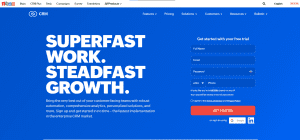
Zoho CRM is a cloud-based CRM platform that has a suite of tools designed for Web3 businesses.
It offers integrations with several blockchain-based platforms, including Ethereum and Binance Smart Chain.
Here are some of the features offered by Zoho CRM in each pricing plan:
Free: Zoho CRM’s free plan offers basic features such as contact management, lead management, and basic reporting.
Standard: For $18/month, Zoho CRM’s Standard plan includes more advanced features such as sales forecasting, document library, and social media integration.
Professional: Zoho CRM’s Professional plan offers even more advanced features such as territory management, advanced reporting, and workflow automation for $30/month
Enterprise: Zoho CRM’s Enterprise plan includes the most advanced features, such as advanced customization options, role-based security, and multi-currency support and it’s priced at $45/month
Ultimate: The Ultimate Plan stands alone as a significant – and costly – upgrade. Because this plan is only available with a yearly contract, you’ll be paying upwards of $55/month for a full year, which is more than double the cost of the most expensive plan available.
It’s worth noting that Zoho CRM pricing is determined by the number of users and the features you require.
As a result, before deciding on a plan, you need to carefully assess your needs and budget.
It’s also worth noting that some features may be available as part of a higher-priced plan or as an add-on, so carefully review the feature list before selecting a plan.
Sugar CRM:
Sugar CRM is a one-of-a-kind CRM platform that’s designed to supercharge your interactions with prospects and customers, while also giving your sales performance a major boost. And the best part? It won’t break the bank! It is renowned for being cost-effective, allowing you to reduce your total cost of ownership by up to 32%.
Sugar CRM also offers comprehensive reports that provide in-depth insights into your customer interactions. It’s like having your very own personal data analyst right at your fingertips. And speaking of insights, get ready to have your mind blown by the power of artificial intelligence. That’s right, Sugar CRM brings AI-powered insights to the table, helping you make smarter decisions and stay one step ahead of the competition.
In today’s business landscape, data is king. And that’s where SugarCRM shines. Thanks to its bidirectional API, you can seamlessly sync your data between SugarCRM and other mission-critical systems. No more wasting time manually entering data or dealing with messy data silos. SugarCRM has got your back!
Finally, the icing on the cake is that Sugar CRM has started delving into the exciting world of blockchain integration. By leveraging the immutability and decentralized nature of blockchain technology, SugarCRM aims to take data integrity and security to a whole new level within its CRM system. Talk about staying ahead of the game sugar CRM is not one to relax on that.
Copper CRM:
Copper CRM is a blockchain-based CRM platform designed specifically for the cryptocurrency and blockchain industry. It enables businesses to manage their customer relationships, token sales, and investor relations while leveraging blockchain technology for added security. Although a little different from your regular CRM platforms, it still has its own unique features. Let’s look at some of the unique features of the Copper CRM.
Features of Copper CRM
Google Workspace Compatibility: Copper CRM is a sales automation solution designed to cater specifically to Google Workspace users. As such, it seamlessly integrates with Google Workspace apps, including Google Contacts and Google Calendar, making it a convenient choice for those already familiar with Google products. Copper CRM appears as a sidebar within Gmail, allowing users to access its features without leaving their inbox, thus saving time and reducing distractions.
Simplicity: Simplicity is a core principle of Copper CRM, making it user-friendly and intuitive. Its sidebar feature allows users to quickly find tasks, and tracked emails, opportunities, or companies with minimal clicks, compared to other CRM tools. The customer information is easily accessible through contact profiles, avoiding the need for users to search for the data they require. The Copper CRM mobile app also follows this simplicity-focused approach.
Automation: Automation is a significant driver behind investing in CRM, and Copper offers workflow and task automation in its top two tiers. This automation helps eliminate manual data entry and repetitive tasks, such as auto-populating contact entries using email signatures, LinkedIn profiles, and company websites. Two-way sync between Copper and Google Contacts ensures that contact information is always up-to-date in both systems.
Management: Lead management features in Copper CRM are robust, aiding in generating, storing, and nurturing new leads. Users can enter leads manually or import them in bulk from Excel, Salesforce, or LinkedIn. Copper CRM even acts as a personal assistant, suggesting actions based on email interactions to help determine potential leads. Custom triggers and reminders can be set up based on the lead’s position in the pipeline.
Customized Reporting: For reporting, Copper CRM simplifies the process with templates and a drag-and-drop interface. It allows users to create customized reports on various aspects, such as opportunities won and lost, or activity reports on conversations with prospects, leads, and contacts. Custom reporting is available on Professional and Business plans.
Easy & Quick Onboarding: Onboarding with Copper CRM is quick and straightforward due to its emphasis on simplicity and education. The platform provides extensive guides, videos, and tutorials to help users get started without hassle. Copper’s exceptional customer support is available to assist users when needed.
Security: Security is a top priority for Copper CRM, and it implements first-class backup management and data resiliency systems. Third-party testing ensures that security measures meet industry standards. Copper follows strict access control policies to protect user data internally, and synced emails remain private, accessible only by admins and account owners. The platform complies with best practices for SSO, OpenID, API, Google Cloud, and OAuth.
Industry Range: Copper CRM proves valuable across various industries. It benefits agencies in managing client relations, aids real estate businesses in handling listings, allows tech companies to scale efficiently without manual data entry, and supports consulting and corporate development firms in managing deals.
Read Also: How To Make Money With Web3 in 2023
What are the benefits of using web3 CRM?
1. Improved Customer Relationships – A web3 CRM system can help you to build better relationships with your customers by providing a central database. This database can contain the entire history of interactions between your company and each individual customer, as well as their interests and preferences.
2. Increased Efficiency – With a web3 CRM system, all customer data is stored in one location which makes it easy to access and analyze. This can save your team hours of time by eliminating the need to search for data across multiple platforms.
3. Improved Sales and Marketing – Analyzing data on customer interactions and behaviors can help to identify potential leads, improve customer targeting, and help to craft personalized marketing messages. Furthermore, a web3 CRM system can help sales teams to manage their leads and prospects more efficiently, allowing them to focus on closing deals.
4. Increased Collaboration – A web3 CRM system can help to facilitate improved communication and collaboration among your team members. This can help to increase productivity and ensure that everyone is working towards the same goals.
5. Enhanced Reporting – A CRM system can provide real-time data on key performance indicators such as lead conversions, customer retention rates, and customer satisfaction rates. This data can help you to make informed decisions and adjust your strategy as needed.
6. Improved Customer Service – A CRM system can help to improve customer satisfaction rates by providing your team with the information they need to better serve your customers. By tracking customer interactions, you can address issues more quickly and proactively address potential problems before they become major issues.
7. Greater ROI – By improving sales, marketing, and customer service, a web3 CRM system can help to increase your overall return on investment. With a better understanding of your customer’s needs, behaviors, and preferences, you can improve your products and services over time and increase customer loyalty.
Here are some other popular upcoming SAAS Web3 CRM companies that are still becoming adopted by users in 2023:
The next-generation blockchain CRM for crypto and NFT marketers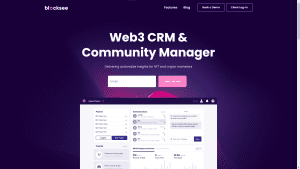
2. erxes XOS 
3. Yobi – A CRM for small businesses.
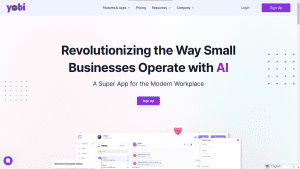
Use your preferred platform to centralize all of your customer conversations into one inbox, regardless of the channel.
Wrapping Up
In conclusion, web3 CRMs are here to transform the way businesses interact with their customers.
By combining blockchain technology with traditional CRM systems, web3 CRM offers unparalleled security, transparency, and data ownership to both businesses and customers.

